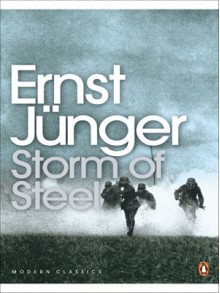
Storm of Steel
'As though walking through a deep dream, I saw steel helmets approaching through the craters. They seemed to sprout from the fire-harrowed soil like some iron harvest'. "Storm of Steel" is one of the greatest works to emerge from the catastrophe of the First World War. A memoir of astonishing...
show more
'As though walking through a deep dream, I saw steel helmets approaching through the craters. They seemed to sprout from the fire-harrowed soil like some iron harvest'. "Storm of Steel" is one of the greatest works to emerge from the catastrophe of the First World War. A memoir of astonishing power, savagery and ashen lyricism, it illuminates like no other book the horrors but also the fascination of total war, presenting the conflict through the eyes of an ordinary German soldier. As an account of the terrors of the Western Front and of the sickening allure that made men keep fighting on for four long years, "Storm of Steel" has no equal.
show less
Format: paperback
ISBN:
9780141186917 (0141186917)
Publish date: September 1st 2007
Publisher: Penguin
Pages no: 320
Edition language: English

Ernst Jünger's account of his years fighting as a German soldier on the Western Front during World War One is one of the most graphic I have ever read in terms of descriptions of injuries and violence. That said, much of a soldier's life is routine and boring, and Jünger covers this aspect too.I was...

Read By: Charlton Griffon Copyright: 2010 Audiobook Copyright: 2010 Genre: HistoryFile Information================ Number of MP3s: 16 Total Duration: 9:42:40Blurb: This classic war memoir, first published in 1920, is based on the author...

As the son of a Second World War combat veteran, there is something about November 11th that resonates deep within me. That day brings into sharp relief the sacrifices made by the veterans of the First World War. For that reason, while scanning my library a few days ago, I resolved to read an eyew...

Ernst Junger's memoir of his time on the Western Front (1914-1918) is a powerful glimpse at what it's like to be a soldier, made all the more powerful because it's unadorned with philosophical introspection or politics. The reader joins Junger as he joins his unit in Champagne and leaves him during ...

I think Junger is reflecting a lot of the duality or conflict that many soldiers in combat feel; an intense feeling of camaraderie and living on the edge that brings reality into sharper focus. Yet on page 260 (Penguin edition) he says: "...I felt I had got tired, and used to the aspect of war, but ...

